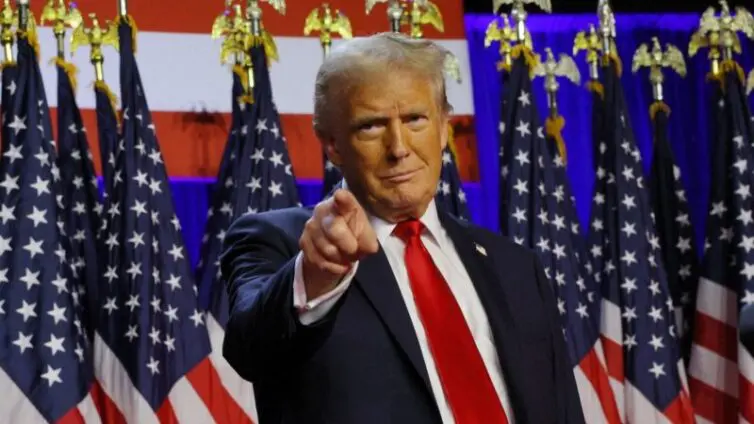Discredited and ousted from the White House in 2020, Donald Trump has made a historic return to the U.S. presidency. This outcome is rare in American history, with only one previous president, Grover Cleveland, having achieved such a feat (1885-1889 and 1893-1897).
Trump’s victory, coming against considerable odds, coincides with a period of significant global transition and transformation. As his triumph is celebrated by his supporters worldwide, the implications of a second Trump presidency for the current fractured global order will be debated in many capitals around the world. This victory will trigger a reconfiguration of foreign policy options for numerous nations.
Across Africa, Trump’s second term holds various implications for the continent and its development agenda. The United States remains an important partner in Africa’s growth. Through initiatives like the African Growth and Opportunity Act (AGOA) and the Millennium Challenge Corporation (MCC), the U.S. has sought to facilitate Africa’s integration into the global economy.
Additionally, the U.S. and its Western allies have had a significant influence on governance and democratic development across Africa. The democratization movements in many African countries during the early 1990s were partly fueled by strong pushes from the U.S. and its allies, who viewed bad governance and undemocratic regimes as key drivers of Africa’s political and economic challenges.
The U.S. also hosts a large number of African migrants whose remittances are critical to economic growth and livelihoods back home. The African-American community plays an important bridging role in U.S.-Africa relations, and many African countries have sought to attract African-Americans to return and invest in the continent.
Beyond the direct relationship between the U.S. and Africa, the performance of the U.S. economy is crucial to developing markets like those in Africa. U.S. Federal Reserve policy decisions can significantly affect how African countries access international capital markets and service their dollar-denominated debts. Meanwhile, the U.S. military and intelligence agencies continue to play key roles in addressing insecurity in many parts of Africa, despite recent pushbacks in countries like Niger, Mali, and Burkina Faso.
Indirectly, U.S. foreign policy elsewhere—including its approach to China and the Middle East—will affect global stability, which is essential for Africa’s development. It also influences the so-called “new scramble” for Africa among powers such as China, Russia, the U.S., and European nations. A foreign policy shift under Trump, likely to emphasize an “America First” approach, could further fragment global markets. Such developments may accelerate the institutionalization and expansion of alternative global structures like BRICS, which challenge the U.S.-led world order. All of these changes will have significant consequences for Africa.
In all fairness, a second Trump presidency presents mixed implications for Africa. Some of these implications are highlighted below.
1. Funding to Africa to remain consistent, but cuts likely in areas like Climate Change Financing
During his first term, Trump was accused of neglecting Africa. However, despite this criticism, the U.S. still provided an annual average of $7-8 billion in funding to the continent. In comparison, the Biden administration promised to reset U.S.-African relations on a foundation of equal partnership, pledging around $55 billion in funding to Africa over three years, beginning in 2022. This funding was aimed at addressing contemporary challenges such as health, climate change adaptation, and energy transitions.
However, a recent U.S. Congressional Research Service report (November 7, 2023) on non-humanitarian State Department and USAID assistance to Africa showed that, despite Biden’s more friendly African foreign policy posture, U.S. funding to the continent remains within the $7-8 billion range annually. Therefore, it is likely that funding under a second Trump presidency will remain consistent with this trend. However, areas like climate change financing may face cuts, as the Trump administration is likely to scale back on many of the Biden-era commitments related to climate funding. The Biden administration’s plan to increase aid under the $55 billion initiative may not materialize, as Trump and the Republican Party will likely reprioritize funding areas according to their own strategic interests.
2. Trade and investment present an uncertain and complicated dynamic
Trade and investment are areas where Trump presents a more complex and uncertain dynamic for Africa. While U.S.-Africa trade and investment relations had advanced during Biden’s term, these gains may face setbacks under Trump, who is likely to focus on areas that align with his “America First” approach to foreign policy. As a result, efforts by the Biden administration to enhance trade and investment with Africa could be watered down or reversed.
This creates a mixed picture for the continent, with countries that align with U.S. strategic interests likely to be prioritized over others. With the current AGOA set to expire in September 2025, its future is uncertain, adding further complexity to trade relations. Trump may use the renegotiation of AGOA to advance U.S. strategic interests on the continent. Additionally, the implementation of the African Continental Free Trade Area (AfCFTA) could complicate matters for the Trump administration. A successful AfCFTA could make the African market strategically important to the U.S., especially if the trade war with China intensifies.
3. Uncertainty in U.S. role promoting Good Governance and Democracy
There is little doubt that the U.S. has been a leading force in promoting governance and democratic reforms in Africa since the fall of the Berlin Wall and the end of the Cold War. Under the Biden administration, the U.S. has used a combination of aid, sanctions, and diplomatic pressure to address democratic backsliding across the continent. Despite Biden’s ideological commitment to democracy, there were occasions when American interests took precedence over promoting democratic values. For example, the Biden administration took over three months to recognize the military coup in Niger in 2023, which led to the suspension of military aid in accordance with U.S. law.
A second Trump administration is likely to further prioritize U.S. national security interests over ideological promotion of democracy. Trump could use the waiver provision in the 2023 Consolidated Appropriations Act to engage military regimes that align with U.S. interests. This would likely lead to more inconsistent U.S. engagement in Africa, with a more pragmatic, interest-driven approach replacing the promotion of democracy and good governance. This could make efforts to consolidate democracies in Africa more challenging, especially in light of the current backsliding in several countries.
4. Emboldening Africa’s resistance to LGBTQ+ and other human rights issues
The Biden administration’s open support for LGBTQ+ rights has been one of the most contentious issues in its relations with many African countries. For example, Uganda was removed from AGOA after passing harsh anti-LGBTQ+ laws. Trump, who has openly campaigned against LGBTQ+ rights, is likely to provide a reprieve for countries like Uganda that face U.S. pressure on human rights. Countries that were previously removed from AGOA and other U.S. initiatives over human rights concerns may be brought back into the fold. This could reduce the pressure on African nations to adopt progressive LGBTQ+ policies, which may have implications for the continent’s human rights landscape.
5. Focus on Terrorism and Areas of U.S. Geopolitical Interest
While the U.S. under Trump will likely continue to address security issues in Africa, particularly terrorism, any engagement will be strictly aligned with U.S. national security interests. Insecure regions that do not directly threaten U.S. interests are likely to be deprioritized. Countries with vital natural resources or those involved in key geopolitical competition will likely receive more attention. As global competition for resources intensifies, Trump’s focus on U.S. strategic priorities may lead to increased engagement with certain African countries, while leaving others neglected.
6. Migration presents a challenge for African-U.S. relations
Trump has long been committed to protecting the U.S. border, which will likely affect African migrants, especially those without proper documentation. During his first term, attempts to deport illegal African migrants sparked tensions with countries like Ghana, which requested time to verify the backgrounds of those targeted for deportation. Given that immigration remains a key issue for Trump’s political base, similar confrontations are likely to arise again. For majority-Muslim African countries, such as Nigeria, Tanzania, and Somalia, the possibility of another travel ban cannot be dismissed. The restrictions imposed during Trump’s first term, which affected these countries, may be reinstated, complicating migration and potentially having socio-economic implications for African households that rely on remittances.
Conclusion
Trump’s return to the White House comes amid a significantly changed world, one in which he played a pivotal role in shaping during his first term. His “America First” approach to foreign policy will have broad implications for global geopolitics, including in conflict areas like Israel-Palestine and Russia-Ukraine. Regions that were previously neglected, such as Africa, are likely to become more important as geopolitical tensions rise. However, if Trump remains consistent with the policies he implemented during his first term, the scenarios outlined above are likely to unfold in Africa.
The author, Ishmael Kwabla Hlovor, PhD, is a lecturer at the University of Education, Winneba.
















